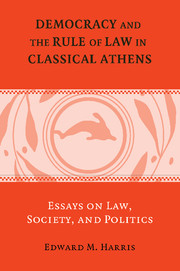Book contents
- Frontmatter
- Contents
- PREFACE
- ACKNOWLEDGMENTS
- ABBREVIATIONS
- INTRODUCTION
- I LAW AND CONSTITUTIONAL HISTORY
- 1 Solon and the Spirit of the Law in Archaic and Classical Greece
- 2 Pericles' Praise of Athenian Democracy
- 3 Antigone the Lawyer, or the Ambiguities of Nomos
- 4 How Often Did the Athenian Assembly Meet?
- 5 When Did the Athenian Assembly Meet? Some New Evidence
- 6 Demosthenes and the Theoric Fund
- II LAW AND ECONOMY
- III LAW AND THE FAMILY
- IV ASPECTS OF PROCEDURE
- V ENVOI
- BIBLIOGRAPHY
- INDEX LOCORUM
- SUBJECT INDEX
5 - When Did the Athenian Assembly Meet? Some New Evidence
Published online by Cambridge University Press: 25 February 2010
- Frontmatter
- Contents
- PREFACE
- ACKNOWLEDGMENTS
- ABBREVIATIONS
- INTRODUCTION
- I LAW AND CONSTITUTIONAL HISTORY
- 1 Solon and the Spirit of the Law in Archaic and Classical Greece
- 2 Pericles' Praise of Athenian Democracy
- 3 Antigone the Lawyer, or the Ambiguities of Nomos
- 4 How Often Did the Athenian Assembly Meet?
- 5 When Did the Athenian Assembly Meet? Some New Evidence
- 6 Demosthenes and the Theoric Fund
- II LAW AND ECONOMY
- III LAW AND THE FAMILY
- IV ASPECTS OF PROCEDURE
- V ENVOI
- BIBLIOGRAPHY
- INDEX LOCORUM
- SUBJECT INDEX
Summary
for ancient historians prospecting for facts about their period, the scholia found in the medieval manuscripts of Classical authors furnish much ore of varying quality. As those who have explored these regions can attest, the scholia contain many auriferous seams and, for the unwary, much fool's gold. Some entries in the scholia bear the imprint of an ancient authority and clearly consist of precious material. Yet others, which seem initially to flash with the gleam of authenticity, are, when more closely examined, found to have little value, often composed of one part reasonable inference, the rest irresponsible guesswork. The process of extraction can be difficult, and one must be careful not to mistake the spurious for the genuine. But we should also not be too quick to discard information contained in a scholium simply because its author neglected to stamp it with the citation of an ancient source. Such haste impoverishes the study of ancient history.
The purpose of this chapter is to rescue from the rubbish heap a nugget of information about the Athenian assembly found in a scholium to Dem. 24.20. The first part of this scholium informs us that the Athenians used to hold three meetings of the Assembly each month, but if some military emergency suddenly arose, an extra meeting might be summoned. The second part tells us at what times of the month meetings of the Assembly were normally held.
- Type
- Chapter
- Information
- Democracy and the Rule of Law in Classical AthensEssays on Law, Society, and Politics, pp. 103 - 120Publisher: Cambridge University PressPrint publication year: 2006



